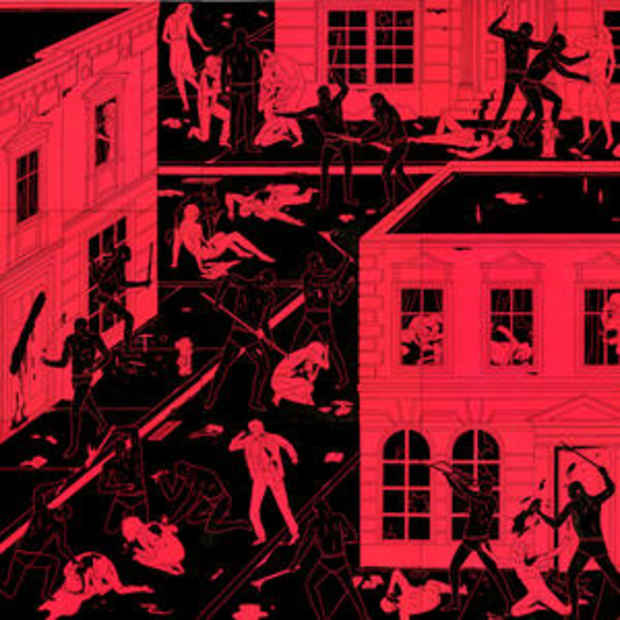Cleon Peterson "White Flag"
Joshua Liner Gallery

This event has ended.
Joshua Liner Gallery presents White Flag, an exhibition of new paintings by the Los Angeles-based artist Cleon Peterson. This is Peterson’s first solo show at the gallery.
If the title of this new body of work suggests a surrender, it’s not the conventional sort. Known for his depictions of graphic violence and depravity, Peterson’s dystopian art rips the lid off of accepted social decorum to unleash aggression and other pent-up impulses. As figures torture, maim, cut, and abuse one another, a surrender to the worst in humanity is staged on the surfaces of the artist’s work—here, it can be safely, cathartically, and even aesthetically enacted.
Rendered in acrylic on paper mounted on board, these 15 medium- to large-size works take violence as their symbolic subject. Lifelike but not realistic, Peterson’s figures engage in a kind of kabuki-esque power ritual. In Into Darkness, for instance, seemingly helpless aristocrats are massacred by nondescript “shadow” figures in a theatrical setting of neoclassical architecture. Clad only in briefs, the menacing “shadow” assailants appear hairless and somewhat neuter. Starkly rendered in flat perspective and only two hues—red and black—the contrast between the figures at first seems apparent, but this impression gives way to ambiguities of motive, intent, and culpability.
Even more starkly contrasted, the battlefield of A Balance of Terror is presented in black and white, with black “shadow” figures on horseback and white victims played in pools of blood. Here, again, scenes of torture and murder are status quo, with some figures engaging intermittently in banal chitchat and postures of relaxation. The Practice of Masters takes this moral ambiguity to its natural conclusion: the shadow figures are presented to engage in self-attack, as “brothers” raise knives, broken bottles, and insults against each other.
Though White Flag depicts the most horrendous acts of violence, the compositions are balanced, harmonious, and otherwise pleasing to the eye, displaying a balletic “dance macabre” of torturer and victim. While conjuring up allusions to famous uprisings, such as the French Revolution, the Soweto Riots, or even current images from Libya, the artist, in fact, draws his inspiration from the writings of Friedrich Nietzsche and Carl Jung. Like Nietzsche, Peterson creates a world where contrasting moral schemes result in eruptive hostility. And like Jung, Peterson explores the tension between the conscious ego and repressed “shadow,” the unconscious area of the psyche where rejected and banished self-knowledge gains intensity and is personified.
White Flag starkly contrasts the unemotional ruthlessness of the “shadows” and the white-hot pain of their victims. The shadows hardly show signs of rage in their reductive facial features and indiscriminate malice, while their targets wear expressions of horror and anguish. Though the shadows clearly have the upper hand in these slaughter scenes, the settings’ topiaries and grand foyers suggest that the other side is not entirely powerless. In these ambiguous depictions of innocence and evil, Peterson asks viewers to consider for themselves where their sympathies lie.
Born in 1973 in Seattle, Cleon Peterson received a BFA from Art Center College of Design in Pasadena and an MFA from Cranbrook Academy of Art in Detroit; he currently lives and works in Los Angeles.
[Image: Cleon Peterson "Into Darkness" (2011) Acrylic and spraypaint on 9 panels
72 x 75 in.]
Media
Schedule
from May 17, 2011 to June 11, 2011
Opening Reception on 2011-05-19 from 18:00 to 21:00